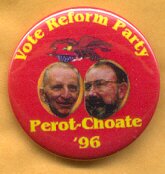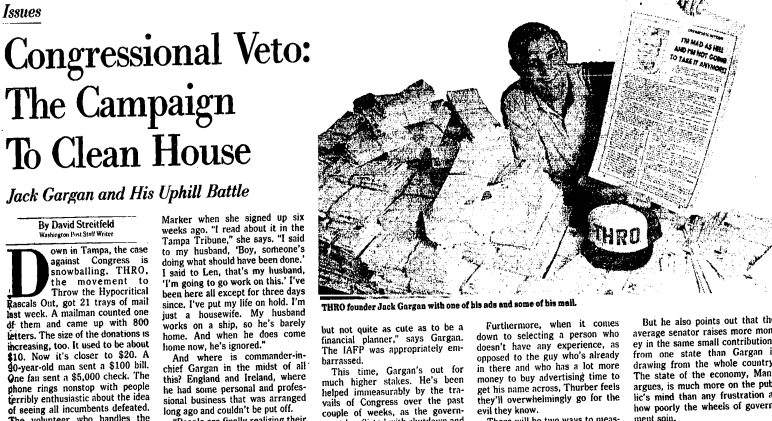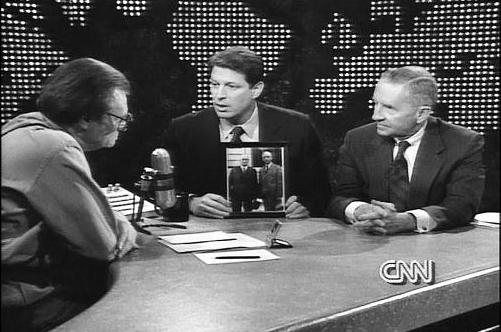> repressed memories
Ross Perot, Last American Leftist
 Last month H. Ross Perot's former adviser and running mate Pat Choate wrote a Huffington Post column declaring Paul Ryan the single biggest and most “noxious” of all Washington's countless professional liars. That same week, the prolific libertarian Thought Leader and former Reason editor Virginia Postrel Paul Ryan the “Ross Perot of 2012.” This is the story of how both statements came simultaneously to be true.
Last month H. Ross Perot's former adviser and running mate Pat Choate wrote a Huffington Post column declaring Paul Ryan the single biggest and most “noxious” of all Washington's countless professional liars. That same week, the prolific libertarian Thought Leader and former Reason editor Virginia Postrel Paul Ryan the “Ross Perot of 2012.” This is the story of how both statements came simultaneously to be true.
Pat Choate was one of those well-intentioned Washington lifers who come along every few years who had to learn the magnitude of Washington's corruption the hard way: by writing a bestselling book exposing said corruption and getting fired, blacklisted, ostracized, messily divorced and 30 pounds heavier from the accompanying solitary food bingeing as a result.
Like Whatever it Takes, the much maligned (and subsequently forgotten) 1997 book that prepared me to ignore this election, was about lobbyists. Choate was himself a lobbyist for the defense maufacturer TRW when he wrote the book to expose the $400 million a year influence apparatus Japanese industry trade organizations had erected to convince politicians and opinion leaders to repeatedly roll back tariffs and quotas on their exports while throwing the American manufacturing sector to the wolves; he was fired shortly after it was released. More distressingly, he was dismissed—by Michael Kinsley, and not even in the Journal!— as a racist McCarthyite Japan-basher attempting to reinvent another Yellow Peril.
But then a billionaire technology entrepreneur read the book, and started talking it up to everyone he knew, even slipping a hearty recommendation into an appearance on the McNeil Lehrer News Hour, to which he'd been invited in March 1991 ostensibly to discuss “lessons of the Gulf War”:
PEROT: You and I have to go look in the mirror, because we own this country. The folks in Washington don't own it. Now there's a problem here. The special interests control Washington, not the people. And if you don't believe that, read the book “Agents of Influence” by Pat Choate, and you'll conclude that the international lobbyists own this town. That's driven by the cost of elections and the need to buy TV time to run. All that can be cleaned out if the people exercise their will.
LEHRER: All right. I have to exercise the will to go -- an unwill to go but have to exercise. Thank you very much, Mr. Perot.
Agents of Influence ultimately inspired Perot's whole political career—and gave Choate a second act as a senior campaign adviser commonly called “Perot’s brain.” And to their combined credit, Perot’s brain on matters of substance remained remarkably lucid, consistent and focused during the surreal and volatile four years that followed. Sure, he had some odd personal notions about a GOP plot to crash his daughter's wedding, but his political convictions were unflappable. He spent all of seven words—“I think this is a woman’s decision”—on abortion, blaming failing infrastructure and the weak economy for the “breakdown of the family” that preoccupied the culture warriors of the day. And while he often invoked the menace of debt and deficits on the campaign trail, it was always as a byproduct of the trade deficit he sought to attack with a robust Japan-style industrial policy.
Which is pretty much what sunk the campaign, lest you forgot about the outrageous time he called the NAACP “you people.” This is about the only thing I actually remember about Perot in 1992, other than the fact that I'm fairly certain he was the first and only candidate for whom both my grandfathers voted. In any case, the “you people” speech was such an unmitigated disaster, so grotesquely offensive, so transparently hate-fueled that he dropped out of the race altogether a few days after delivering it under pressure from all the distinguished black leaders in the audience he alienated forever with this unforgivable slur, such as Congressman war hero Charlie Rangel:
When Perot re-entered the race at the end of September, he blamed GOP threats of “dirty tricks” for spooking him off the trail; that, along with the ostensibly embarrassing revelation that his campaign was asking potential electors to sign loyalty oaths to deter them from unilaterally giving any potential electoral votes he won to another candidate as electors are legally entitled to do, was treated in the press as evidence of “paranoia” and an irrational lust for control.
It's hard to believe in hindsight that Perot was paranoid enough; even after the ten week sabbatical and the more virulent strain of media scorn that accompanied him in the campaign's final weeks, he brought in a full 19% of the popular vote. He was the most dangerous candidate the status quo had seen since probably FDR. And once the election was over, he turned his laserlike focus to the most radioactive slice of his political agenda: defeating NAFTA. The next fall he and Choate published a detailing the agreement's gory provisions, and together they marshaled the full force of his supporter database and his grassroots operation United We Stand America to spread word of the bad bargain and debated it on CNN with Al Gore. It seems pretty likely in hindsight the trade deal would have been what the consenusphere calls a “two day story” if not for the inimitible H. Ross.
But with the democracy ritual over and done with the tone of Perot’s press coverage achieved new heights of condescension. Meanwhile, the Perot political organization had been infiltrated and was on its way toward becoming thoroughly hijacked by a crew of veteran astroturf lobbyists—in a project that started, appropriately enough, with Japanese embassy adviser Eddie Mahe. Mahe had in 1990 founded a new lobby, financed primarily by the famous Koch brothers, focused on promoting the (appealing in perception, insidious in reality) concept of across-the-board term limits. Like most lobbies of the sort, the Term Limits lobby boasted an array of interconnected endlessly renamed organizations; a few token “liberal Democrats” in the leadership ranks—among them, former Oklahoma state legislator , who now proudly identifies as a “consigliere to the vast right wing conspiracy”—to preserve said organizations’ “nonpartisan” tax exempt statuses; a fraught partnership with mailing list magnate Richard Viguerie; and roots at George Mason University, to which the Kochs had been donating heavily since the early eighties.

Team Term Limits also had its very own Rick Santelli in retired Florida financial planner and ardent Jack Gargan, who reportedly spent $10,000 of his retirement savings to place a folksy full-page ad headlined “I’m Mad As Hell And I’m Not Going To Take It” professing his rage toward “shady dealings” by the “clowns in Congress” in a Sunday edition of the St. Petersburg Times. The ad marked the official launch of another, scrappier group, THRO (for “Throw the Hypocritical Rascals Out”), which would in turn sprout the Draft H. Ross Perot for President Committee in 1992.
The nerve center of the term limits lobby was Citizens for a Sound Economy, a GMU spinoff founded to promote free trade and lower taxes in 1984 by GMU economics professor-turned-GMU administrator-turned-Koch lobbyist Rich Fink; Ron Paul was its inaugural chairman.* CSE started plowing money into term limits in 1990, spending more than $540,000 to promote a 1991 ballot initiative in Washington state alone; that was voted down after the Kochs were outed as its major backers. But the term limits lobby just doubled (quadrupled?) down for 1992, sponsoring term limits initiatives in 14 states that year after an obligatory round of name changing and oil baron distancing.
Perot did not formally support term limits in 1992 because, as he told one newspaper, “they aren’t all rascals.” But Gargan was easily the most charismatic organizer in the Perot network, and when he mysteriously dropped out of the race for ten weeks that summer while continuing to sustain a multimillion dollar effort to get him on the ballot, the term limits lobby seemed an obvious ally, along with a natural issue to sustain the political media while they tried to coax their leader back into the election. And when Perot emerged at the end of September to handily “win” the debate and a fifth of the popular vote, term limit initiatives passed in 14 out of the 14 states sponsoring them in 1992. A campaign borne of outrage over the revolving door between Congress and K Street had been co-opted to legally compel the door to speed it up a few notches.
And since CSE was the flagship tenant of the massive Capitol Hill pro-NAFTA lobby, the Perot organization had been essentially co-opted by the giant sucking sound itself, lending credence if nothing else to the precision of Perot’s metaphor. Of the eleven UWSA members who were elected to Congress in 1992, eight voted for NAFTA, eight were incumbents and all were Republicans.
The American left is comprehensively resigned to half the electorate voting against its own economic self-interest in the name of clinging to guns and religion, but that’s not what went down with Perot’s voters. Galvanized by a decisively populist, secular candidate with a very straightforward agenda of curbing the country’s corruptionist economic policy, the base was near instantaneously co-opted by an astroturf network dedicated to promoting precisely that corruptionist policy. Perot voters in 1992 were split pretty evenly down the middle in exit polls inquiring about their second choice. By the 1994 midterms, despite the fact that congressional Democrats had opposed NAFTA by a 3:2 margin while their GOP counterparts approved it by an overwhelming 3:1 margin, Perot supporters leaned Republican by nearly a twenty point margin at the polls.

And it is hard to blame them. It was, after all, not Newt Gingrich but Al Gore who had commenced his nationally televised “debate” on the trade deal by presenting Perot with a framed photo of Reed Smoot and Willis Hawley, the sponsors of a Depression era tariff hike that Jude Wanniski, a supply side cretin so corrupt he actually got fired from the Wall Street Journal editorial page for ethics violations, fished out of the dustbin’s ash heap in the late 1970s and fashioned into the favorite fictitious Depression instigator of revisionist historians who find Milton Friedman too intellectually honest. Well, spaketh the handsome young internet inventor to the data systems billionaire:
They raised tariffs, and it was one of the principal causes, many economists say the principal cause, of the Great Depression in this country, and around the world.
I keep getting stuck at this part, where America elects its first Democratic president in twelve years and before he can even cop a feel he’s sending his family-friendlier half on TV to teach all the folks at home about the legitimate rape theory of Depression economics. Did they endorse the “pollution comes from trees” theory of air quality, also, while I was naively finishing geometry homework and drafting Model UN resolutions under the misguided assumption some sort of nanny state was working to ensure there might be an economy left when I graduated from school? What about the “caused by spores emitted by AIDS patients” theory of birth defects? It’s just hard to wrap my mind—possessing as it does its own proprietary albeit idiosyncratic personal memories of the more humane, affordable, reality-based nation we all inhabited back in 1993—around the extravagance of the cynicism/stupidity the Clinton White House was demonstrating right out of the gate here, on national TV. VEEP: SMOOT-HAWLEY 'PRINCIPAL CAUSE' OF GREAT DEPRESSION. You gotta think it was a pretty good night in the life of Larry Kudlow's coke dealer.
There was so much more of this to come, of course: when they balanced the budget and bailed out the peso and bailed out Long Term Capital Management; “ended welfare as we know it” and repealed Glass-Steagall and retained Michael Boskin to extreme makeover all the economic indicators as a backdoor means of slashing Social Security and Medicare; when they dropped cases against Murdoch and the Kochs and pardoned Marc Rich and divested the Administration of irksome anachronistic anti-”team players” like Bob Reich and Brooksley Born. But it’s helpful to know that before any of this, a mere seven months into Clinton’s presidency and a whole year before he hired back his old frenemy Dick Morris, the guy was not satisfied to simply capitulate to the whims of massive unaccountable multinational corporations, or even lackadaisically ride the free trade wave, no; he sent his most popular emissary out into the court of public opinion swinging a long discredited supply sider talking point with a literal frame around it. And the consensusphere response was unanimous: Gore killed it. Perot was trounced—no, Flattened.
Perot stayed mad enough about his debate with Gore that he not only supported most Republicans—albeit neither of the Bushes on the ballot that year, nor a few others whose Dem opponents he preferred—in 1994; he ultimately endorsed George W. Bush, despite genuinely loathing the entire family, in the 2000 election. But again, given all we know now, can you really blame him?
To be fair to the Democrats of the mid-nineties, Clinton in 1992 not only brought a measly six voters for every ten Obama brought in 2008 he actually made a convincing attempt—in Drew’s narration of events anyway—to win back Congress in 1996. Not that I have a TV, but when I did Obama gave me so little reason to infer he had any desire to alter the ideological makeup of Congress that I can only assume he’s happiest just being the guy who’s not Paul Ryan. Which presents whoever is actually in charge of these things with a predicament: how does Obama win in November without inadvertently bringing with him a legislature that might pressure him to enforce an antitrust statute or a securities law on a billionaire donor now and again?
 I think part of the answer here is Gary Johnson, the United We Stand America card-carrying Perot Republican construction magnate who rose from total obscurity to occupy the New Mexico governor’s mansion in the 1994 GOP sweep. Johnson is currently the official 2012 Libertarian Party candidate for president, and while he is possibly the least impressive American politician outside the Tea Party freshman class I have ever bothered Nexising, he is at least more charismatic than the last candidate who ran for president on the Libertarian ticket, former Clinton impeachment manager Bob Barr (whose campaign was, incidentally, run by Perot 1996 manaager Russell Verney.) It probably goes without saying that he is also more charismatic than Mitt Romney. Supposed polls in certain purported battleground states suggest he could draw as much as nine percent of the vote; there's been a lot of “spoiler” speculation around his campaign in the Beltway hack press. But as consummate Beltway hack Mark Ambinder observed in 2010, Johnson is not exactly drowning in “street cred.”
I think part of the answer here is Gary Johnson, the United We Stand America card-carrying Perot Republican construction magnate who rose from total obscurity to occupy the New Mexico governor’s mansion in the 1994 GOP sweep. Johnson is currently the official 2012 Libertarian Party candidate for president, and while he is possibly the least impressive American politician outside the Tea Party freshman class I have ever bothered Nexising, he is at least more charismatic than the last candidate who ran for president on the Libertarian ticket, former Clinton impeachment manager Bob Barr (whose campaign was, incidentally, run by Perot 1996 manaager Russell Verney.) It probably goes without saying that he is also more charismatic than Mitt Romney. Supposed polls in certain purported battleground states suggest he could draw as much as nine percent of the vote; there's been a lot of “spoiler” speculation around his campaign in the Beltway hack press. But as consummate Beltway hack Mark Ambinder observed in 2010, Johnson is not exactly drowning in “street cred.”
Which is where the other part of the answer, Ron Paul, comes in. The faint possibility he'll endorse Johnson seems to be the single hope sustaining the fading would-be rascal-defenestrating constituency. Although his domestic policy stances are for the most part the diametric opposite of Ross Perot's, Paul is short and Texan and capable of publicly acknowledging the truth in a way we haven't really seen since Ross Perot was on the scene. As long as they're fully intent on dismantling the welfare state, deregulating industry and plundering our entitlement programs no matter which party you vote for, Ron Paul gets points simply for sparing us all the associated bullshit. Which is I guess why he's not on the ballot.
*The group’s first-ever mention in the news media, a Xinhua article about CSE’s opposition to textile import quotas, suggests an open door to business from emerging markets, but the “Koch Machine” also had much at stake in international trade negotiations, as apostate Murray Rothbard observed in an essay attributing the peculiar “hysteria” to pass NAFTA to a $1.7 billion natural gas pipeline to Mexico Koch had acquired the year earlier. After courting a bit too much press during the 2004 election for its role commandeering the effort to get Ralph Nader on the ballot, CSE dropped its name and split into two groups, FreedomWorks and Americans for Prosperity.
